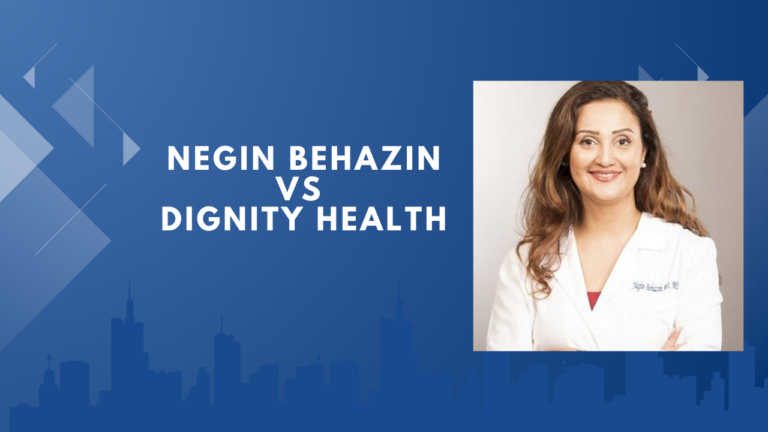The legal battle between Negin Behazin vs Dignity Health has caught the attention of both the medical community and the general public. At the heart of the lawsuit lies a complex dispute involving discrimination, workplace rights, and ethical standards in the healthcare industry. Understanding the details of this case offers a closer look into how hospitals and physicians navigate sensitive legal and professional issues.
The Background: Who Are Negin Behazin and Dignity Health?
Dr. Negin Behazin is a physician who became publicly known due to her dispute with Dignity Health, a prominent healthcare provider operating numerous hospitals and medical centers across the United States. Her case brings forward allegations of discrimination and wrongful termination, which she claims occurred due to her advocacy for patient rights and refusal to comply with unethical practices.
Dignity Health is one of the largest healthcare systems in the U.S., with a strong presence in states like California, Arizona, and Nevada. Founded on Catholic values, the organization is known for delivering patient care that adheres to religious and moral directives. These values, while guiding for many, have also sparked controversies when medical decisions clash with patient rights or physician judgment.
The tension between these two parties raises important questions about institutional power, whistleblower protection, and the limits of ethical responsibility within medical systems.
Legal Claims and Allegations: What the Lawsuit Is About
Dr. Behazin filed a lawsuit against Dignity Health claiming that she was discriminated against and retaliated upon after raising concerns about patient care practices. According to her statements, she faced workplace hostility, professional isolation, and eventually termination due to her refusal to stay silent.
Also Read
She alleges the following points:
- She was asked to perform medical actions that went against her ethical judgment.
- She spoke out about possible neglect or mistreatment of patients.
- After raising concerns, she was subjected to unfair treatment by supervisors.
- Her employment was terminated under questionable circumstances.
Dignity Health, on the other hand, has denied the allegations and defended its actions as aligned with organizational policies and standards. They argue that Dr. Behazin’s claims are unfounded and that the termination was handled appropriately based on performance metrics and workplace behavior.
This clash brings to light the challenges medical professionals face when balancing patient care with institutional expectations.
Religious Directives vs. Medical Ethics
A significant point of tension in this case revolves around the religious foundations of Dignity Health and how they may conflict with standard medical practices. Catholic healthcare systems are often guided by the “Ethical and Religious Directives for Catholic Health Care Services,” a set of rules issued by the United States Conference of Catholic Bishops.
These directives influence decisions about:
- End-of-life care
- Reproductive services
- Gender-affirming procedures
- Contraceptive access
If a physician like Dr. Behazin disagrees with these policies and chooses to prioritize broader medical standards or patient autonomy, conflicts can arise. The core of the lawsuit hints at this very issue—where do we draw the line between religious values and universally accepted medical ethics?
Whistleblower Protection and Retaliation
The concept of whistleblowing is central to this case. A whistleblower is someone who reports misconduct or unethical behavior within an organization, often at personal risk. In healthcare, these reports can save lives, improve safety, and ensure accountability.
Dr. Behazin positions herself as a whistleblower who faced retaliation for speaking up. She claims that:
- Her concerns were ignored by upper management.
- She was penalized for refusing to participate in practices she found harmful.
- Her firing was an act of retaliation rather than a legitimate HR decision.
Whistleblower protection laws exist at both federal and state levels to prevent such retaliation. The challenge, however, lies in proving that adverse actions like termination are directly linked to whistleblowing activities. Employers may argue that poor performance or interpersonal issues were the actual reasons, making it a difficult legal hurdle for plaintiffs.
Timeline of Events: From Employment to Lawsuit
Understanding the timeline helps bring clarity to the sequence of events that led to the legal confrontation.
| Date | Event Description |
|---|---|
| Early 2020 | Dr. Behazin begins working at a Dignity Health-affiliated hospital |
| Mid 2020 | Reports concerns about patient care and administrative pressure |
| Late 2020 | Experiences increased scrutiny and professional isolation |
| Early 2021 | Terminated from her position |
| Mid 2021 | Files a lawsuit citing discrimination and retaliation |
| 2022–2024 | Ongoing legal proceedings and public discourse |
This progression outlines how quickly workplace disputes can escalate when communication breaks down and legal protections are tested.
Impact on the Medical Community and Public
The case of Negin Behazin vs Dignity Health has sparked widespread debate over medical ethics, workplace rights, and institutional accountability.This case is not just about one doctor and one hospital. It reflects broader systemic issues in healthcare, such as:
- How hospitals treat physicians who speak out
- The limitations of religious policies in a secular society
- The role of legal systems in protecting employee rights
Healthcare professionals watching this case may become more cautious about reporting concerns. Alternatively, it might encourage institutions to adopt more transparent and supportive policies to prevent similar lawsuits.
From a public perspective, trust in healthcare institutions can be shaken when stories like these become headlines. Patients may wonder whether decisions about their care are based on best practices or religious guidelines. Such concerns highlight the importance of transparency and informed consent in medical environments.
Expert Opinions and Legal Insights
Legal experts observing the case note that the outcome could set precedents for how future whistleblower claims in religious healthcare systems are handled. Some believe that if Dr. Behazin wins, it might lead to stricter oversight of religious directives in medical care. Others argue that the case could reinforce the autonomy of faith-based hospitals to operate within their values.
Medical ethics professionals also emphasize the need for clearer boundaries and communication between institutional policies and professional responsibilities. Physicians should have access to ethics committees or ombudspersons to help navigate conflicts before they escalate. Similar legal scrutiny has been seen in high-profile financial cases, such as the Brook Taube Wells Notice, where regulatory action raised questions about professional accountability.
Key legal insights include:
- Whistleblower retaliation cases must prove causality, not just correlation.
- Religious hospitals are legally permitted to enforce faith-based policies but must still comply with civil employment laws.
- The burden of proof in employment lawsuits often favors the employer unless detailed evidence exists.
What’s Next for the Case?
As of now, the lawsuit is still under legal review, and no final judgment has been passed. Both parties have presented their claims, and discovery processes are underway. It may take several more months—or even years—before a resolution is reached.
Possible outcomes include:
- A court ruling in favor of Dr. Behazin, possibly with financial compensation or reinstatement.
- A dismissal of the case if insufficient evidence is found.
- An out-of-court settlement that avoids further publicity.
Regardless of the result, this lawsuit is likely to remain a reference point in future discussions about workplace ethics, religious influence in healthcare, and whistleblower rights.
Final Thoughts
The case of Negin Behazin vs Dignity Health teaches us that medical care is not just about science—it’s also shaped by values, ethics, and legal frameworks. Physicians like Dr. Behazin represent the moral conscience of the system, raising alarms when things go wrong. Institutions like Dignity Health play a vital role in delivering care but must also ensure that their internal culture does not silence ethical dissent.
Patients, healthcare workers, and policymakers all have a stake in this conversation. Protecting the rights of medical professionals to speak up without fear is essential for a safer, more just healthcare system.




